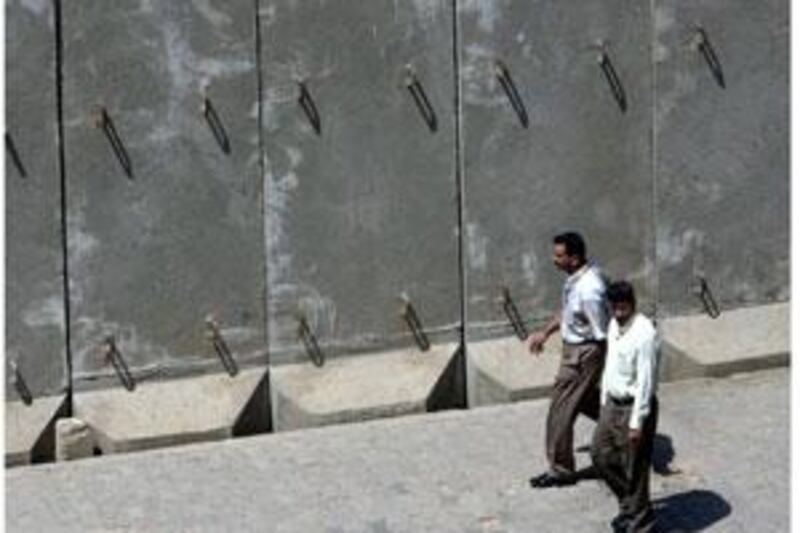BAGHDAD // The towering concrete blast walls that have both protected and suffocated Baghdad streets for the past two years will come down within 40 days, according to an announcement by Iraq's government. Although the walls helped reduce violence, they are unsightly towering reminders for Baghdad residents that their riverside capital of leafy neighbourhoods and palm-lined boulevards has turned into a prison-like city of shadows separating one community from another.
Maj Gen Qassim al Moussawi, the spokesman for the city's operations command centre, said yesterday the walls will be taken off major thoroughfares and secondary roads in the capital. "No exception will be made any place in Baghdad," he said in a statement, the first by an Iraqi official to give a specific time frame for the demolition. The Iraqis already have removed some blast walls and reopened some streets, including the renowned Mutanabi book market.
Maj Gen al Moussawi did not say what the city would do with the millions of tons of concrete. The announcement was the latest in a government push to restore a sense of normality and shore up public confidence ahead of national elections scheduled for January. The US military, which erected most of the walls, said yesterday it had not been informed of the decision - an indication of the Iraqis' increasing confidence as the two sides redefine their relationship with the expected withdrawal of the Americans by the end of 2011.
First introduced by the Americans in 2003 to protect their Green Zone headquarters, walls became much more widespread in early 2007 with the launch of a major security campaign to reduce rampant sectarian bloodshed. The concrete went up around market places, banks and along major roads. There was hardly a street in Baghdad without a wall - or a cheaper substitute like barbed wire, palm tree trunks, mounds of dirt or piles of rocks.
In some walled-off neighbourhoods, access was granted only on proof of residence or special ID cards. Rows after rows of barrier walls - as high as six metres in some sections - divided the city into smaller and smaller areas that protected people from bombings, sniper fire and kidnappings. They also led to gridlock and rising prices for food. For many Iraqis, the walls are the iconic image of the war. Some walls are colourful, painted by young local artists with scenes depicting green pastures or the pomp and glory of Iraq's ancient civilisations. Others are commercial, plastered with flyers advertising everything from the local kebab joint to seaside holidays in Iran or university degrees in Ukraine. Still others are religious or political, with posters of popular clerics or graffiti hostile to the United States, Israel or Iraq's prime minister.
Most are just bleak and grey, a reminder that danger lurks on the other side. There has been a dramatic decline in violence nationwide over the past two years, but worries remain that Iraqi security forces do not yet have a handle on the situation as bombers continue to strike after periods of calm. Underscoring the dangers, a grenade targeted a US convoy carrying a high-ranking military official in western Baghdad yesterday but no casualties were reported.
Gunmen also opened fire on a police patrol in the northern city of Mosul, killing one officer. And a car bomb exploded in the Anbar provincial capital of Ramadi, killing a civilian, according to police. Anbar is a former insurgent stronghold that has been increasingly violent in recent weeks. Anti-US Shiite cleric Muqtada al Sadr, meanwhile, distanced himself from an extremist Shiite group of former followers that has entered into talks with the Iraqi government and renounced violence. Representatives from Asaib Ahl al Haq, or League of the Righteous, met with the prime minister Nouri al Maliki, a Shiite, over the weekend. The group, which the US believes is backed by Iran, has broken with Mr al Sadr and is allegedly behind the killing of five American soldiers as well as the kidnapping of five British contractors two years ago.
It promised to lay down its weapon and join the political process, while the government said it would seek the release of detainees from the group in US custody, according to government officials. Mr al Sadr, who declared a ceasefire after his fighters were routed in US-Iraqi military operations, also demanded the US release his followers ahead of the upcoming Islamic holy month of Ramadan. He warned the Iraqi government against dealing with Asaib al Haq.
"Anybody linked to the resistance does not have the right to participate in political affairs," he said in the statement issued to journalists in the Shiite holy city of Najaf. The statement comes as Shiite factions increasingly have begun manoeuvring to assert themselves politically ahead of national parliamentary elections scheduled for January. * AP





